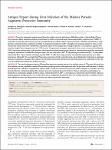Antigen Export during Liver Infection of the Malaria Parasite Augments Protective Immunity
Montagna, Georgina N.
Beigier-Bompadre, Macarena
Becker, Martina
Kroczek, Richard
Kaufmann, Stefan H. E.
Matuschewski, Kai
Protective immunity against preerythrocytic malaria parasite infection is difficult to achieve. Intracellular Plasmodium parasites likely minimize antigen presentation by surface-expressed major histocompatibility complex class I (MHC-I) molecules on infected cells, yet they actively remodel their host cells by export of parasite factors. Whether exported liver-stage proteins constitute better candidates for MHC-I antigen presentation to CD8(+) T lymphocytes remains unknown. Here, we systematically characterized the contribution of protein export to the magnitude of antigen-specific T-cell responses against Plasmodium berghei liver-stage parasites in C57BL/6 mice. We generated transgenic sporozoites that secrete a truncated ovalbumin (OVA) surrogate antigen only in the presence of an amino-terminal protein export element. Immunization with live attenuated transgenic sporozoites revealed that antigen export was not critical for CD8(+) T-cell priming but enhanced CD8(+) T-cell proliferation in the liver. Upon transfer of antigen-specific CD8(+) T cells, liver-stage parasites secreting the target protein were eliminated more efficiently. We conclude that Plasmodium parasites strictly control protein export during liver infection to minimize immune recognition. Strategies that enhance the discharge of parasite proteins into infected hepatocytes could improve the efficacy of candidate preerythrocytic malaria vaccines. Importance: Vaccine development against Plasmodium parasites remains a priority in malaria research. The most advanced malaria subunit vaccine candidates contain Plasmodium surface proteins with important roles for parasite vital functions. A fundamental question is whether recognition by effector CD8(+) T cells is restricted to sporozoite surface antigens or extends to parasite proteins that are synthesized during the extensive parasite expansion phase in the liver. Using a surrogate model antigen, we found that a cytoplasmic antigen is able to induce robust protective CD8(+) T-cell responses, but protein export further enhances immunogenicity and protection. Our results show that a cytoplasmic localization does not exclude a protein's candidacy for malaria subunit vaccines and that protein secretion can enhance protective immunity.
No license information

